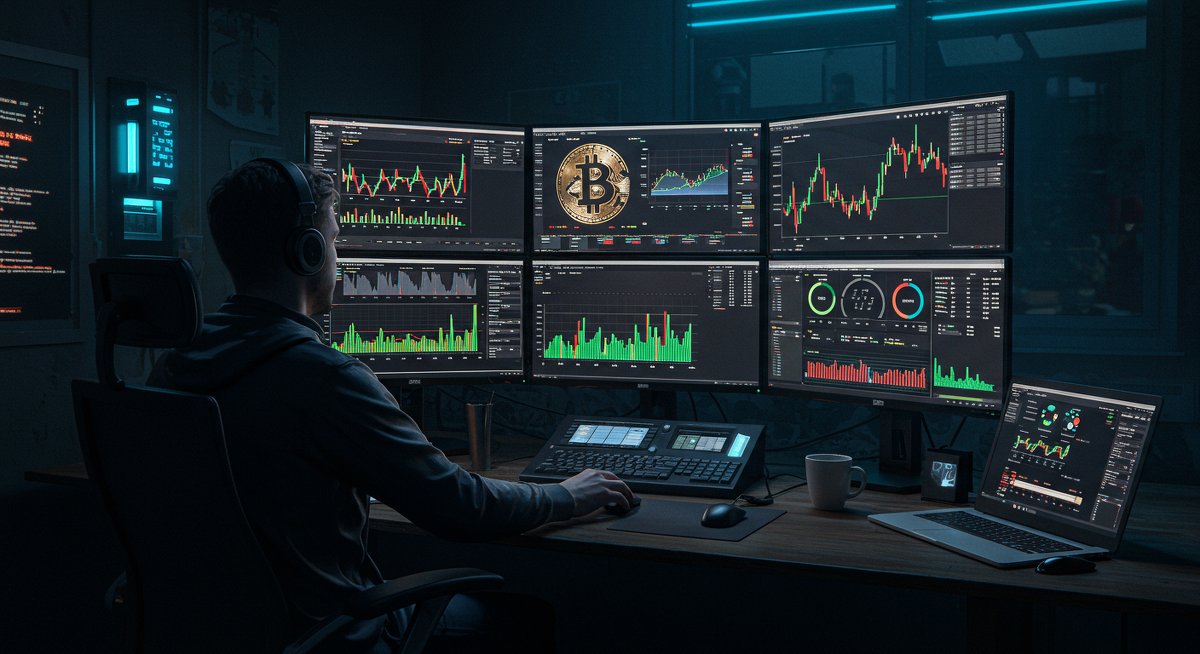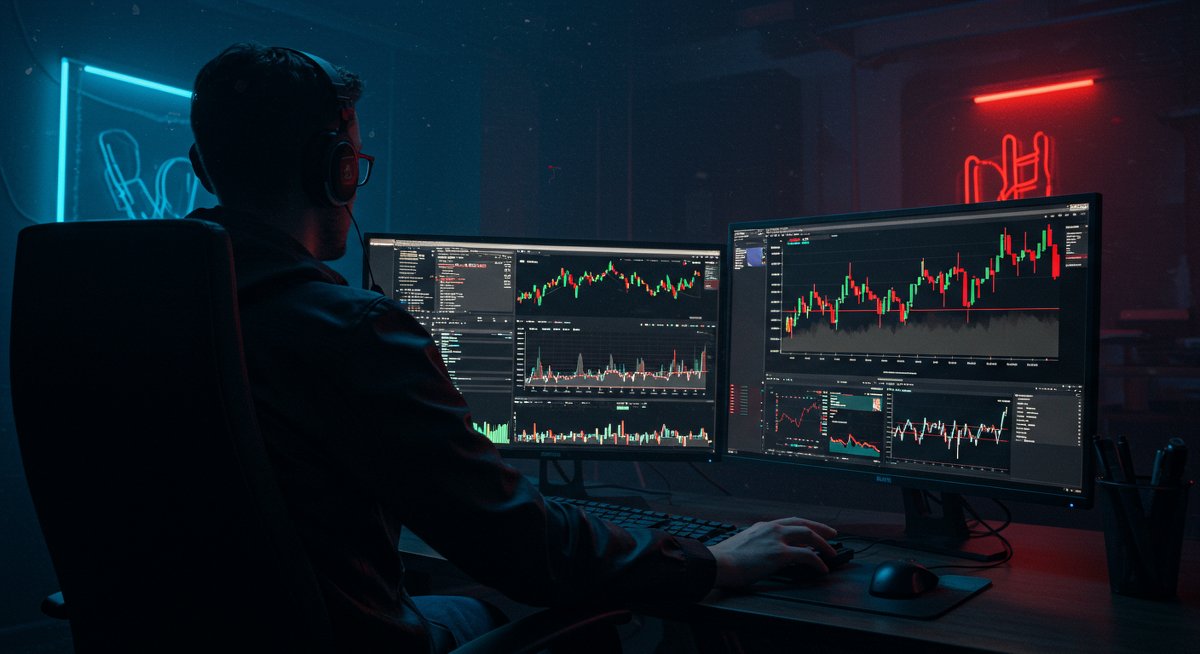Why This Got My Attention
So, I saw this post on r/CryptoCurrency about Ray Dalio recommending that investors allocate 15% of their portfolios to Bitcoin and gold. It definitely made me stop scrolling. Dalio's a pretty big deal in the investment world, and when someone like that talks about crypto, people listen. It's easy to dismiss these pronouncements, but looking closer often reveals valuable insights. So, I thought I’d break down what this actually means for those of us trading crypto, especially if you're doing it from outside the US.
The Reddit post itself was pretty straightforward: Dalio thinks governments are racking up too much debt, and Bitcoin and gold can act as hedges against that. He also mentioned he prefers gold, and doesn’t see central banks adopting Bitcoin anytime soon. That last part is important, and something we'll circle back to. Whether you agree with Dalio or not, it's worth considering why someone with his experience is even talking about Bitcoin in the same breath as gold. This isn't about blindly following advice; it's about understanding the rationale and applying it to your own situation.
What really grabbed me was the discussion happening in the comments. You had the usual mix of "Bitcoin is the future!" and "It's all a scam!" But there were also some genuinely thoughtful points being raised about risk management, diversification, and the impact of global economic policies on crypto. That's the kind of conversation that's actually useful, and it's what I want to dig into here. Is 15% the right number? Maybe. Maybe not. But understanding the why behind the suggestion is way more important than just taking it as gospel.

Here's What Actually Happened
Okay, so let's unpack what Dalio is actually saying. The core of his argument is that governments are overspending, which leads to inflation and currency devaluation. In that kind of environment, traditional assets like stocks and bonds might not perform as well. Gold has historically been seen as a safe haven in times of economic uncertainty, and Dalio's arguing that Bitcoin can play a similar role. The 15% allocation is basically a hedge – a way to protect your portfolio if things go south in the traditional financial system.
He's also highlighting a key risk: government debt. Many countries are carrying massive amounts of debt, and servicing that debt becomes more difficult as interest rates rise. This can lead to a whole host of problems, from higher taxes to reduced government spending. Dalio's point is that these risks aren't fully priced into the market yet. People are still assuming that governments will be able to manage their debt, but what if they can't? That's where assets like gold and Bitcoin come in.
Now, why does he prefer gold? That's where things get interesting. Gold has a long track record as a store of value. It's been used as currency for centuries, and it's relatively stable. Bitcoin, on the other hand, is much newer and more volatile. Dalio's probably concerned about the regulatory risks surrounding Bitcoin, as well as its potential for large price swings. He also doubts that central banks will adopt Bitcoin as a reserve currency, which limits its potential upside in his view. But even with those reservations, the fact that he's even mentioning Bitcoin alongside gold is a sign of how far crypto has come. It's moved from being a fringe asset to something that mainstream investors are at least considering.
What This Actually Means for You as a Crypto Trader
So, what does all this mean for you? Well, if you're already trading crypto, you're probably ahead of the curve. You understand the potential benefits and risks of Bitcoin, and you're comfortable with its volatility. But even if you're a seasoned trader, Dalio's comments are a good reminder to think about your portfolio allocation. Are you too heavily invested in crypto? Do you have enough exposure to other assets? Diversification is key, especially in uncertain times.
If you're not already in crypto, Dalio's suggestion might be a good reason to dip your toes in. But don't just blindly allocate 15% of your portfolio to Bitcoin without doing your research. Start small, understand the risks, and gradually increase your position as you become more comfortable. Remember, Bitcoin is still a relatively new asset, and it's not for everyone. It is also useful to check out platforms like Changelly to understand potential coins to invest in.
Dalio's comments also highlight the importance of staying informed about global economic trends. Keep an eye on government debt levels, inflation rates, and central bank policies. These factors can all have a significant impact on the price of Bitcoin and other cryptocurrencies. The more you understand the macroeconomic environment, the better equipped you'll be to make informed trading decisions. Think of it this way: Dalio is giving you the "why," but it is up to you to consider the "how" in your specific scenario.
The Stuff Nobody Talks About: Real Risk Management
Okay, let's talk about the stuff nobody wants to hear: risk. Dalio is suggesting Bitcoin as a hedge, a way to reduce risk in your portfolio, not increase it. That's a critical distinction. If you're treating Bitcoin as a get-rich-quick scheme, you're doing it wrong. The point is to protect your wealth, not gamble it away.
Bitcoin is volatile. It's prone to sudden price swings, and it's not uncommon to see double-digit percentage drops in a single day. If you can't stomach that kind of volatility, Bitcoin might not be for you. Before you allocate any money to Bitcoin, ask yourself how you would react if the price dropped by 50% tomorrow. Would you panic and sell? Or would you hold on and wait for it to recover? Your answer to that question will tell you a lot about your risk tolerance.
And let's be real, the regulatory landscape around Bitcoin is still uncertain. Governments could crack down on crypto, making it more difficult to buy, sell, or use. That's a risk you need to be aware of. Similarly, security is a huge concern. If you're not careful, you could lose your Bitcoin to hackers or scammers. Always use a secure wallet, enable two-factor authentication, and be wary of phishing attempts. Never share your private keys with anyone. In fact, consider a hardware wallet, like Ledger or Trezor.
If You're Trading from Outside the US
Now, if you're trading crypto from outside the US, there are a few additional things to keep in mind. First, tax laws vary widely from country to country. In some countries, Bitcoin is treated as property, and you're required to pay capital gains tax on any profits you make. In other countries, the rules are less clear. Make sure you understand the tax laws in your jurisdiction, and consult with a tax professional if you're unsure.
Second, regulatory risks can be even greater outside the US. Some countries have banned Bitcoin outright, while others have imposed strict regulations on crypto exchanges. Before you start trading, check the legal status of Bitcoin in your country, and make sure you're complying with all applicable laws. For example, in some countries, you may need to report your crypto holdings to the government. Similarly, many countries have restrictions on how much money you can send overseas.
Finally, keep in mind that Bitcoin is a global asset. Its price is affected by events happening all over the world. Stay informed about economic and political developments in different countries, and be aware of how they might impact the crypto market. The regulations in the US will vary greatly from those in the EU or Asia, so remain abreast of the changes. A platform like KuCoin is very helpful, as they keep track of all the changes and regulations from the major global markets.

Actually Doing This Stuff: A Practical Guide
Okay, so how do you actually implement Dalio's suggestion? Let's say you have a $100,000 portfolio. According to Dalio, you should allocate $15,000 to Bitcoin and gold. Let's assume you want to split that evenly, so $7,500 to each. Here's a step-by-step guide:
- Choose a reputable crypto exchange: Coinbase, Kraken, and Binance are all popular options. Do your research and choose an exchange that's available in your country and has a good reputation. Before you start, make sure you understand the fees charged by the exchange. Some exchanges have high fees for buying and selling Bitcoin.
- Create an account and verify your identity: This usually involves providing your name, address, date of birth, and a copy of your government-issued ID. Most exchanges require you to verify your identity before you can start trading. This is to comply with anti-money laundering regulations.
- Fund your account: You can usually do this via bank transfer, credit card, or debit card. Be aware that credit card companies may charge extra fees for crypto purchases. Bank transfers are usually the cheapest option.
- Buy Bitcoin: Once your account is funded, you can buy Bitcoin. You can either place a market order, which will execute immediately at the current price, or a limit order, which will only execute when the price reaches a certain level. If you're new to trading, start with small amounts.
- Store your Bitcoin securely: Don't leave your Bitcoin on the exchange. Transfer it to a secure wallet that you control. Hardware wallets are the most secure option. Alternatively, you can use a software wallet, but make sure you back up your private keys. Losing your private keys means losing access to your Bitcoin.
My Take on All This
So, here's my take on all this. Dalio's recommendation is worth considering, but it's not a one-size-fits-all solution. Whether or not you should allocate 15% of your portfolio to Bitcoin depends on your individual circumstances, risk tolerance, and investment goals. Don't just blindly follow his advice. Do your own research, understand the risks, and make informed decisions.
I think Dalio is right about the long-term potential of Bitcoin. It's a decentralized, censorship-resistant asset that could become increasingly valuable as governments continue to debase their currencies. But that doesn't mean it's a sure thing. There are plenty of risks, and it's important to be aware of them. Ultimately, the decision of whether or not to invest in Bitcoin is a personal one. There is no guarantee that Bitcoin will go up in value. Its price could crash to zero.
But, I think it's also important to remember that Dalio is an investor, not a trader. What works for him might not work for you. As a trader, you have a different set of goals and a different time horizon. You're not necessarily looking for long-term store of value. You're looking for opportunities to profit from short-term price movements. So, while Dalio's comments are interesting, they shouldn't dictate your trading strategy. Use them as food for thought, but ultimately make your own decisions based on your own analysis. Remember, risk management is key. Never invest more than you can afford to lose.